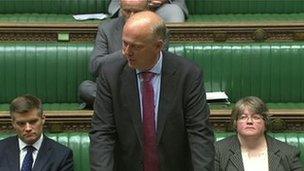The government blinks first
- Published
- comments
There's the substance and then there's the psychology.
And today's government retreat on English Votes for English Laws - it won't be put to the vote next week, and there'll be a two-day "taking the voices debate" on draft proposals, to be followed by a vote on final proposals in the Autumn - shows ministers in a tangle over both.

The Leader of the House, flanked on the green benches by Chief Whip Mark Harper, and deputy Leader Therese Coffey
First, the psychology. There have been a number of embarrassing parliamentary episodes in the last few months, each of which has done some damage; think of the last-day coup attempt against the Speaker in the last Parliament, or the non-vote on the European Arrest Warrant.
Now ministers have been seen off (at least for the time being) in this Parliament, by a combination of all the opposition parties and backbench Tory rebels. As I wrote earlier, the rebels are driven by a cocktail of motives, including ensuring their continued ability to exert leverage over ministers, and they didn't blink .
So even over manifesto commitments, supported by a considerable number of colleagues, the awkward squad remained awkward.
And, equally ominously, the government didn't manage to get any of the smaller parties onside. When the numbers get tight, the Northern Ireland DUP would normally be the first port of call for beleaguered ministers, but they, too, would not budge. Maybe they require earlier courtship, so that deals are cut in good time and good order.
So the overall lesson the rebels and the small parties will draw is that this government has blinked first, in the face of the first real test of its micro-majority. There is much gloating behind closed doors, and we can expect to hear the thud of leather on minister a bit more often.
Meanwhile, the flagship promise to bring in EVEL in this government's first 100 days has run into trouble. It won't be delivered in time, now, and there may even be quite some question over what will eventually be delivered.
Remember that this question has been hovering over Westminster since WE Gladstone's Home Rule bills for Ireland in the 1890s, and no-one's ever come up with a solution that satisfied everybody.
Should the Commons procedural mechanism cooked up by the Leader of the House, Chris Grayling, be tweaked in some way? Or is primary legislation needed?
At the moment, the government has been skewered over process - a one-off vote after an afternoon's debate on Standing Orders could be presented as a rather casual way of enacting major-league constitutional change.
So a more deliberative series of longer debates helps answer that complaint. But what happens if the naysaysers continue to say "nay?"